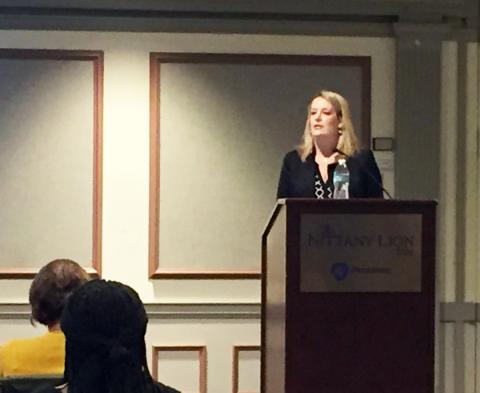
The strategies needed to maintain family economic stability, health and general well-being of rural families was the focus of the 26th Annual National Symposium on Family Issues, held recently at the Nittany Lion Inn on Penn State’s University Park campus.
“The symposium brought together discussion on the realities facing rural families and directions for the future of rural family research,” said symposium organizer Jennifer Glick, director of Penn State’s Population Research Institute and Arnold S. and Bette G. Hoffman professor in sociology.
According to Penn State researcher Ann Tickamyer, professor of rural sociology, many rural families suffering from poverty have been left behind because of the focus shifting to urban poverty. “Contrary to popular belief, rural families are very diverse and experience extreme poverty. Currently, rural poverty has experienced some improvements on par with urban poverty, however many families are still experiencing joblessness.” Symposium presenter Emily Wornell of Ball State University presented work demonstrating the risk rural counties face from the automation of many jobs, a trend that is likely to continue.
Another conference topic focused on how the labor force has affected rural Americans economically and how it has changed family demographics. Marybeth Mattingly, director of the Vulnerable Families Research Program at the University of New Hampshire, established that along with increasing joblessness, marriage rates have decreased and divorce is on the rise. “We also found that many children in rural areas are being raised in single parent homes,” said Mattingly.
African American families who reside in rural spaces outside the traditional “Black Belt” in the southeastern U.S. was also discussed. Shauna Cooper, associate professor of psychology and neuroscience at University of North Carolina at Chapel Hill, revealed that these families have not received as much research or policy attention as they should. “African American families in non-traditional spaces face complicated race-related relations which exacerbates economic gaps.”
In addition to suffering from economic challenges, families in rural areas also are affected by opioid use disorders and opioid mortality. Shannon Monnat, associate professor of sociology and Lerner Chair for Public Health Promotion at Syracuse University and former faculty member at Penn State, says the opioid crisis is not disproportionately rural but rural families face special challenges.
“The opioid crisis is a symptom of other problems, such as ‘big pharma’ targeting rural populations, because people believe the population is less educated, more vulnerable, and experiences more economic turbulence,” Monnat explained. “Our research has found that the fuel of the crisis includes dynamics such as economy, family and social structure.”
She also found that rural areas have more at risk groups with less access to treatment. Other results of opioid disorders include failed drug tests causing work shortages, increases in domestic violence, more child protective services and foster care, and children being raised by grandparents.
Researchers at the conference concluded that life in rural America can be improved if researchers could access more data. “A lack of data leads to a lack of understanding of public opinion and policy formation. More information on rural families could lead to positive impacts on the communities that are facing hardships,” said Tickameyer.
For more information, visit 2018 Family Symposium.
The 2018 Symposium on Family issues is sponsored annually by The Eunice Kennedy Shriver National Institute of Child Health and Human Development. Penn State sponsors include Social Science Research Institute; Population Research Institute; Department of Sociology and Criminology; Clinical and Translational Science Institute; Department of Human Development and Family Studies; Department of Psychology; Department of Agricultural Economics, Sociology, and Education; Prevention Research Center; and the Child Study Center.